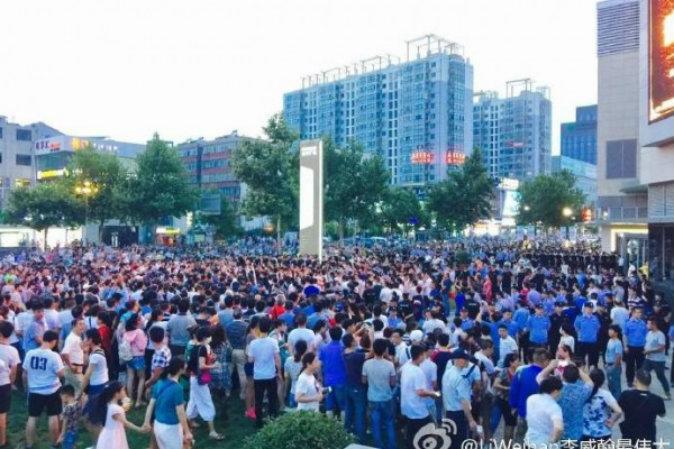Thousands of residents recently protested a proposed government nuclear waste project in the eastern Chinese city of Lianyungang. The Chinese authorities, in what is likely an attempt to downplay the incident, have vigorously policed the Chinese internet, and even tried menacing administrators of public online chat groups.
In the evening of Aug. 6, protests broke out in Lianyungang, a city on the east coast of China with a population of about 5 million. Local residents were concerned that the local authorities might approve the construction of a nuclear recycling and processing plant in the city. There is already a large nuclear power plant in Tianwan, an area about 20 miles east of Lianyungang.
On Aug. 7, over ten thousand protesters took to the streets, Lianyungang residents told Epoch Times. The protesters carried banners and placards, and chanted, “oppose nuclear waste, safeguard our homes,” according to video clips on Chinese social media.
Online clips show riot police dispersing protesters through kicks and blows with their riot shields, while some protesters threw objects at the police. Lianyungang eyewitnesses told Epoch Times that the police arrested over 40 residents and assaulted protesters regardless of age or gender.
Meanwhile, the Chinese internet authorities have adopted a heavy handed approach to online activity about the incident.
On Aug. 6, Chinese police arrested a 30-year-old man from the east coast of China on suspicion of “disseminating false information,” according to Chinese financial publication Caijing. Part of the man’s online post contained the phrase, “Lianyungang police have issued a formal warning!!!”
On Aug. 9, Jiangsu Cyber Police constable number “001137” used the department’s official Sina Weibo microblogging account to warn a Chinese netizen that a post he made about Lianyungang was “severely inconsistent with the facts.” If the netizen didn’t remove the post, he could be detained for up to 10 days for “spreading rumors and disturbing public order,” the post said.
Other online posts were removed by the censors without any warning.
In a 3,300 character article on Weibo, netizen “Karmaxu” argued that official publications like China Youth Daily shouldn’t be “refuting rumors” about the nature of the protest because those in Lianyungang were only concerned about environmental safety. “To us, the safety of our homeland is the most fundamental demand. Isn’t that the case?” the netizen wrote.
Karmaxu’s post was deleted just four minutes after it was posted, according to Weiboscope, a website that tracks censorship on the Chinese internet. Weiboscope is run by the University of Hong Kong’s journalism school.
Security forces have also attempted to intimidate the administrators of online chat forums.
“Those chat group administrators who told everyone to protest … have been invited to drink tea,” Ms. Chen, a resident of Lianyungang, told international radio station Sound of Hope on Aug. 8. The phrase “to drink tea” is a reference to unofficial interrogation sessions with the Chinese police or security agents.
But the nuclear waste project protests don’t seem to be abating in spite of the online clampdown.
More and more people have joined the protests, and they are planning to preserve with civil disobedience, local resident Mr. Ge told Epoch Times on Aug. 8. Another Lianyungang resident who didn’t want to be named said that similar protests are also taking place in the nearby city of Yancheng in Jiangsu Province.
On Aug. 10, the Lianyungang City authorities announced on its official Weibo account that its search for a nuclear waste project site had been suspended.
It is unclear if this announcement will inspire Lianyungang residents to return to their homes; although the Lianyungang government said that the nuclear project was in a “preliminary stage of assessment”, in an official statement on Aug. 7, the demonstrations continued to gain momentum.
Frank Fang contributed to this article.




